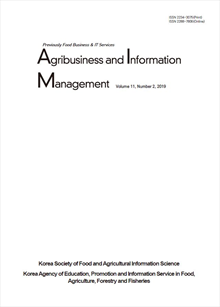간행물
Agribusiness and Information Management

- 발행기관 한국농식품정보과학회
- 자료유형 학술지
- 간기 반년간
- ISSN 2234-3075 (Print)2288-7806 (Online)
- 수록기간 2009 ~ 2021
- 주제분류 농수해양 > 농학 농수해양 분류의 다른 간행물
- 십진분류KDC 522DDC 630
권호리스트/논문검색
Volume5 Number1 (2013년 6월) 5건
1.
2013.06
구독 인증기관 무료, 개인회원 유료
Competition in supply chain has moved from between being organizations to between supply chain. To enhance competitiveness in supply chain, there is a need for organisations to establish and manage collaborative relationships among supply chain partners and share operational and strategic information timely and accurately. As a result, food supply chain partners have adopted of inter organisational information systems (IOIS) such as EDI, IEDI, RFID, internet, and extranets to facilitate exchange of information, streamline production and to effectively manage inventory processes so as to deliver value to the customer. Together with IOIS, cybermediaries also plays a key role in facilitating agriculture and food supply chain. This paper investigates the role and significance of IOIS and cybermediaries in facilitating agriculture and food supply chain. Convergent interviewing was conducted with agriculture producers, food processors and retailers. The study identifi ed logistics, supply chain and customer services benefi ts perceived from implementing IOIS and utilising cybermediaries services in the food supply chain. To conclude the conceptual paper outlined managerial implications and areas for future research.
4,000원
2.
2013.06
구독 인증기관 무료, 개인회원 유료
Price skimming practices, false claim on products, false information/communication, marketing overseas, and deception on products in marketing have received signifi cant attention by the researchers of ethics in marketing studies. This research considers these phenomena as marketing instruments that grossly violate the practice of ethics in this domain. The two most crucial parts in marketing that have received greater attention are product safety and advertising. The paper also examines Ethical Marketing as the ability to make marketing decisions that are morally right and acceptable to all. In order words, ethics in marketing explains how moral standards can be applied in marketing decisions. It seeks to answer the research question by looking at some fundamental business ethics theories, namely, Virtue ethics, Utilitarian, and Deontological approaches to business ethics. Nevertheless, ethics in business is very controversial as many hold different view about what makes up the standard morals that corporations should take and so it is necessary for any organization to formulate its ethical codes to follow.
4,000원
3.
2013.06
구독 인증기관 무료, 개인회원 유료
his paper presents a model explaining industrywide information systems (IS) integration in the agri-industry. Using a theoretical frame of value confi guration analysis and IS integration extent we study 15 organizations. We find that product sensitivity, continuous production, value chain captains, and value creation logic explain the industry-wide IS integration. Incompatible value creation logic among stakeholders and the lack of presence of “value chain captains” – powerful actors dominating the entire industry - has and negative impact on industry-wide integration. On the other hand, product sensitivity and continuous production process led to higher levels of integration.
4,200원
4.
2013.06
구독 인증기관 무료, 개인회원 유료
The research assesses the impact of a digital procurement (e-purjee) system for sugarcane growers in Bangladesh. The system itself is simple, transmitting purchase orders to local farmers via SMS text notifi cation. It replaces a traditional paper-based system fraught with low reliability and delivery delays. Applying expected value theory, and using decision tree representations to depict growers’ decision-making complexity in an information-asymmetric environment, we compute outcomes for the strategies and sub-strategies of ICT vs. traditional paper-based order management from the sugarcane growers’ perspective. The study results show that the digital procurement system outperforms the paper-based system by tangibly reducing growers’ economic losses. The digital system also appears to benefit growers non-monetarily, because of reduced uncertainty and a higher level of perceived fairness. Sugarcane growers appear to value the non-monetary benefi ts even higher than the economic advantages of the e-purjee system.
4,200원
5.
2013.06
구독 인증기관 무료, 개인회원 유료
Information System (IS) Success Model proposed by DeLone and McLean is applied as a successful operation tool of information system, with its basic assumption of symmetric relationship between independent variables and dependent variables of the structural equation modeling. However, because previous studies have proved asymmetry of quality factors' influence structure on dependent variable by applying three-factor analysis, this study examined asymmetry of impact structure of quality factors introduced in IS Success Model on user satisfaction. Also the study applies structure equation modeling (SEM), threefactor analysis and importance and performance analysis (IPA) to develop resource allocation strategy for IS success. The study is able to provide IS practitioners with strategic implications for allocating and managing limited resources more effectively.
4,500원

